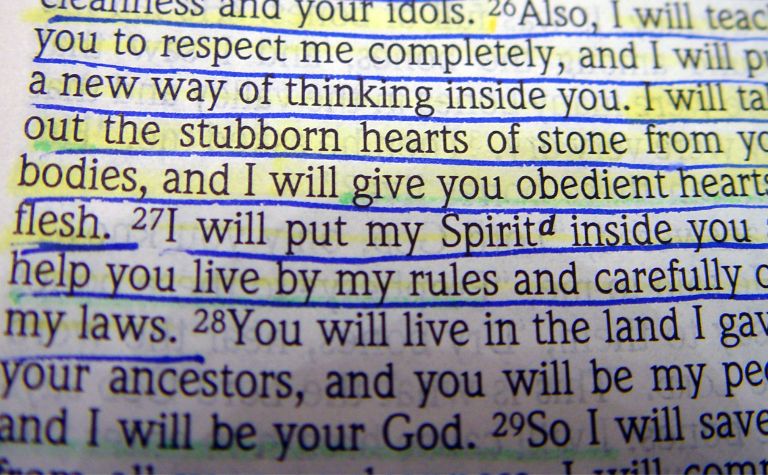Exegesis and eisegesis are different approaches to interpreting a text, particularly in biblical studies.
Exegesis seeks to understand the text’s original meaning by considering its historical, cultural, linguistic, and literary context.
In contrast, eisegesis reads into the text one’s own ideas, beliefs, or biases, often leading to skewed or biased interpretations.
Exegesis is the preferred method in biblical studies, providing a well-rounded and historically grounded understanding of the text.

Comparing Exegetical and Eisegetical Bible Interpretation
“Exegesis” comes from the Greek word “exēgēsis,” meaning “explanation” or “interpretation,” derived from “exēgeisthai,” meaning “to lead out.” It refers to drawing out the meaning of a text.
“Eisegesis” is formed by adding the Greek preposition “eis,” meaning “into,” indicating the insertion of one’s own ideas into a text.
| Feature | Exegesis | Eisegesis |
|---|---|---|
| Definition | Exegesis is the process of interpreting a text by drawing out its meaning based on the context and content of the text itself. | Eisegesis is the process of interpreting a text by reading into it one’s own ideas, beliefs, or biases. |
| Approach | Objective and systematic | Subjective and selective |
| Goal | To understand the original meaning of the text as intended by the author and as understood by the original audience. | To support a preconceived idea or interpretation, often by selectively highlighting or ignoring certain parts of the text. |
| Method | Careful analysis of the text’s historical, cultural, linguistic, and literary context. | Selective use of the text to support a particular viewpoint, often without considering the broader context. |
| Result | A well-rounded and historically grounded understanding of the text. | A potentially skewed or biased interpretation of the text. |
| Use in Biblical Studies | Exegesis is the preferred method in biblical studies, as it seeks to understand the original meaning of the text. | Eisegesis is generally discouraged in biblical studies, as it can lead to misinterpretations and misunderstandings of the text. |
How Does Eisegesis Result in Biased Biblical Interpretations?
Eisegesis can result in biased interpretations of the Bible.
Instead of seeking to understand the text’s original meaning, eisegesis imposes preconceived beliefs or biases onto the text.
This approach can lead to selective reading, where certain passages are highlighted or ignored to support a particular viewpoint.
As a result, the text’s broader context and historical background may be overlooked, leading to skewed or incomplete interpretations.
Eisegesis can distort the message of the Bible, making it important to approach biblical interpretation with an open and objective mindset.

What Is the Process of Biblical Exegesis?
Proper biblical exegesis involves several steps.
(1) Reading the text carefully is the first step in biblical exegesis. Pay attention to keywords and phrases that stand out, as they often hold significant meaning.
Analyze the literary structure, including the flow of ideas and the relationships between sentences and paragraphs. This initial analysis lays the foundation for a deeper understanding of the text.
(2) Studying the historical and cultural context of a biblical text is crucial for understanding its original audience.
This involves exploring the customs, beliefs, and social dynamics of the time when the text was written. By doing so, you can gain insights into the intended message and its significance to the original readers.
(3) Analyzing the text’s language involves examining word meanings, grammar, and syntax. This helps to uncover the nuances and subtleties of the text.
By understanding the specific meanings of words and the relationships between them, you can gain a deeper and more accurate understanding of the text’s message and intent.
(4) Considering the literary genre and style of the text is important for interpretation. Different genres, such as poetry, prophecy, or narrative, have distinct conventions and should be read differently.
Recognizing the style and genre helps to understand the text’s intended meaning and the appropriate way to interpret it.
(5) Consulting commentaries, scholarly articles, and other resources are essential for gaining insights from experts in biblical studies. These resources provide valuable perspectives and interpretations from scholars who have extensively studied the text.
Their expertise can enhance your understanding and help you form a well-rounded interpretation of the passage.
Finally, synthesize your findings to form a well-rounded interpretation of the text. Proper exegesis seeks to understand the text’s original meaning within its historical, cultural, and literary context.

What Is a Simple Example of Biblical Exegesis?
A popular New Testament passage is John 3:16, “For God so loved the world, that he gave his only begotten Son, that whosoever believeth in him should not perish, but have everlasting life.”
Proper exegesis involves understanding the context of this verse. It is part of Jesus’ conversation with Nicodemus, a Jewish leader, about spiritual rebirth.
The phrase “only begotten Son” refers to Jesus’ unique relationship with God.
The word “world” indicates that God’s love extends to all humanity.
The promise of “everlasting life” emphasizes the eternal significance of faith in Jesus.
This verse highlights the central Christian belief in salvation through faith in Jesus Christ.
What Is a Simple Example of Eisegesis?
An example of eisegesis using a popular New Testament passage is the interpretation of Matthew 7:1, “Judge not, that ye be not judged.”
Some people use this verse to argue that all forms of judgment are wrong.
However, this interpretation ignores the broader context of the passage, which warns against hypocritical judgment.
Jesus is not condemning all judgment but rather urging people to examine their own faults before criticizing others.
By reading their own beliefs into the text, individuals may arrive at a skewed interpretation that does not reflect the original intent of the passage.
Proper exegesis considers the broader context and historical background of the text.
Related Questions
Navigating the world of Bible translations can feel like a daunting task. With numerous versions available, each with its unique approach, style, and translation, it's essential to understand their...
Whole Bible commentaries will help you understand every passage of Scripture better. If Bible commentaries on single books are like studying individual trees, whole-Bible commentaries will help you...
